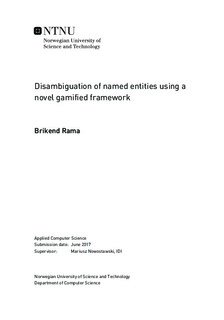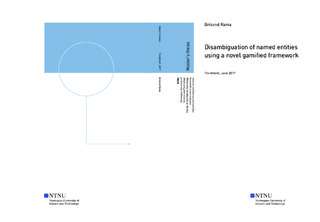| dc.description.abstract | The content generated on the web originates from diverse sources with the main
purpose of serving updated information to the Internet user. Every piece of information
generated is valuable and must be easily traced by modern search engines.
Semantic meta-data as a mechanism for providing meaning to the generated content
is the de-facto requirement for improving search accuracy and facilitating information
discovery on the web. This research represents an attempt for advancing
the field of semantic web in terms of providing an approach for generating semantic
information to the substantial number of unstructured documents available on
the web. The main objective is to utilize the potential of human computation as
a source for improving the performance of supervised and semi-supervised algorithms
in the respective field. Performance improvements are achieved through the
generation of large-scale qualitative annotation data. Being a time and resource
intensive process to be carried out by expert annotators, ordinary non-expert annotators
must be encouraged for contribution.
Gamification as an increasingly popular approach for leveraging human computational
power has been investigated in this research study. It represents the
ultimate tool for encouraging human annotators for contribution in exchange for
an engaging and attractive game. The disambiguation of recognized named entities
within the content of unstructured web documents represents the problem
elaborated in this work. Therefore, the implementation of a generic and scalable
gamified named entity disambiguation framework demonstrating the capabilities
of non-expert users in generating large-scale annotation data represents the main
qualities composing this research study. We specifically focus on benefiting from
gamification as a powerful and prominent approach for leveraging human computation.
Significant and confident results acquired through experimental user studies
support the idea that gamification can successfully leverage human computation
for collaboratively solving complex problems. This comes as a result of game design
which is based on on empirical research, psychological theories for motivation
and standard practice of implementation. | |

